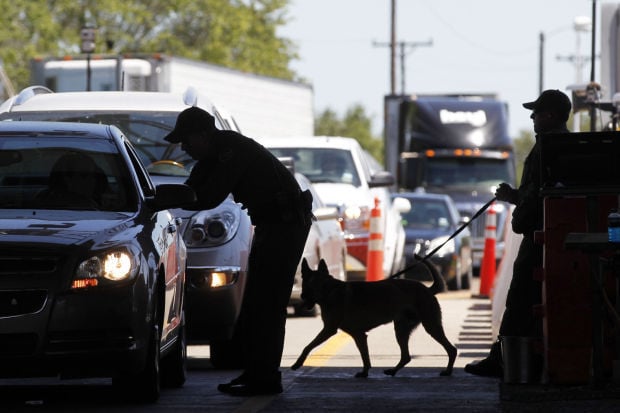Gabriel Rencher‘s first two days in Arizona did not go well.
The 32-year-old native of Eugene, Oregon, moved to Tucson on Christmas Eve. A fan of the “beautiful romanticism of the Southwest,” Rencher decided to make a day trip to Sonoyta, Mexico, on Christmas Day.
After eating lunch, strolling around Sonoyta, and trying out his smattering of Spanish, Rencher crossed back into Arizona, where he picked up his car and headed back to Tucson.
As he drove north on Arizona 85 toward Ajo, he saw a man hitchhiking on the side of the road and decided to pick him up.
“There was this dude hitchhiking in the desert, and it was Christmas,” Rencher said. “I was just trying to be a Good Samaritan.”
Soon after, Rencher and the hitchhiker, a man named José who did not speak English, drove into a Border Patrol checkpoint on Arizona 85. The agents asked for identification and Rencher showed them his passport. But the agents grew suspicious that José was not in the country legally.
That’s when things started to go wrong.
“They rip me out of the car, handcuff me, and throw me into solitary confinement for hours — six, seven, eight hours,” Rencher said.
During the drive, Rencher and José had chatted about José walking across the border. Not knowing what to do, Rencher called his dad in Oregon. His dad checked online and told him there was a shelter in Phoenix where Rencher could take his passenger. So Rencher decided to head there.
“I had no idea I was breaking any law at all. I picked him up in Arizona, not Mexico,” Rencher said. “It never crossed my mind.”
Rencher said he and José were separated immediately after being detained and he does not know what happened to José.
Both men were taken to the Ajo Border Patrol Station, where José admitted he was a Honduran national, the Border Patrol said in response to an inquiry from the Star.
The U.S. Attorney’s Office declined to prosecute Rencher due to the absence of evidence that Rencher was a human smuggler, the Border Patrol said. “Subsequently, he was released from custody in the town of Ajo on his own recognizance.”
In Rencher’s case, being released on his own recognizance meant the agents “dumped me off at a Circle K parking lot around one in the morning,” he said.
Rencher spent the night in the parking lot, still shaken up after his encounter with the Border Patrol. “I kind of realized I got myself in a potentially bad situation,” he said.
Worst of all, the Border Patrol confiscated his 2006 Kia Spectra sedan.
“They didn’t give me my car back, which I think is outrageous,” Rencher said.
Rencher, who worked the past two years as a private investigator for a defense attorney in Oregon, said agents told him the car had become U.S. government property and he likely would not see it again.
The Border Patrol confirmed agents confiscated Rencher’s car and referred it to the agency’s Fines, Penalties, and Forfeitures office, which would send Rencher a notice of seizure.
As of Jan. 7, Rencher said he had not yet received any notice about his car.
The ACLU, which has sued U.S. Customs and Border Protection, the Border Patrol’s parent agency, for incidents at checkpoints, received Rencher’s complaint and is reviewing the case, an ACLU spokesman said.
Federal law prohibits anyone from knowingly transporting a person who is in the country illegally. Two volunteers with No More Deaths faced federal charges in 2005 after Border Patrol agents stopped them near Arivaca with three people who fell ill while crossing the border illegally. The volunteers said they were driving them to get medical care.
A judge dismissed those charges due to the fact that the volunteers were following the organization’s guidelines that had not resulted in arrests for several years. No More Deaths changed their guidelines shortly thereafter.





